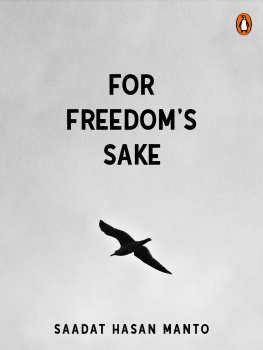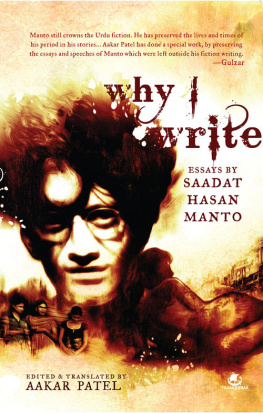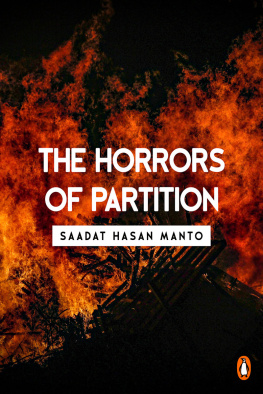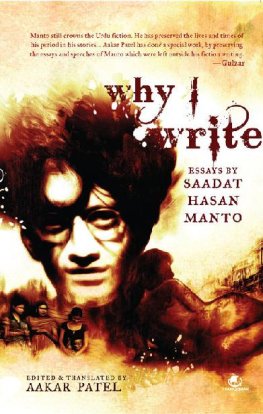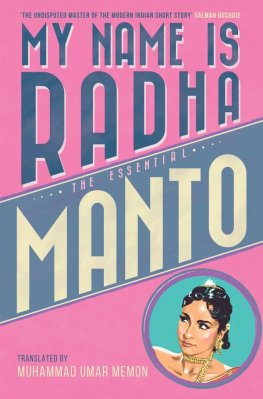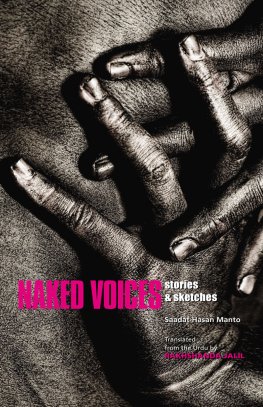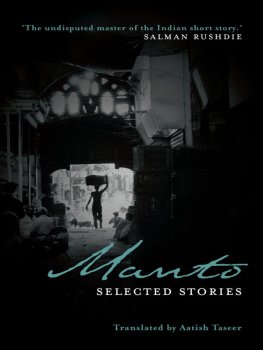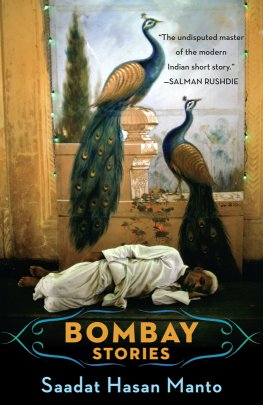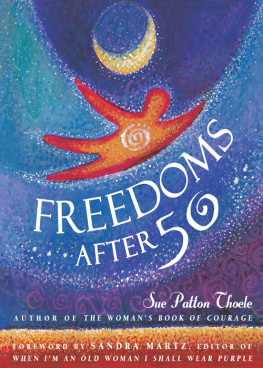Saadat Hasan Manto, the most widely read and the most controversial short-story writer in Urdu, was born on 11 May 1912 at Samrala in Punjabs Ludhiana district. In a literary, journalistic, radio scripting and film-writing career spread over more than two decades, he produced twenty-two collections of short stories, one novel, five collections of radio plays, three collections of essays, two collections of personal sketches and many scripts for films. He was tried for obscenity half a dozen times, thrice before and thrice after Independence. Some of Mantos greatest work was produced in the last seven years of his life, a time of great financial and emotional hardship for him. He died several months short of his forty-third birthday, in January 1955, in Lahore.
Muhammad Umar Memon is professor emeritus of Urdu literature and Islamic studies at the University of Wisconsin-Madison. He is a critic, short-story writer, translator and editor of the Annual of Urdu Studies. He has translated the best of Urdu writers. His most recent translation is Collected Stories, a selection of stories by Naiyer Masud.
For Freedoms Sake
I dont remember the year but it must have been when Amritsar was reverberating everywhere with the cries of Inqilab Zindabad! These cries, I recall, were filled with a strange excitement, a gushing energy one saw only among the blossoming milkmaids of the city as they tore through its bazaars with baskets of uplas carefully balanced on their heads. It was a wild and woolly time. The dread, tinged with sadness, which had hung in the atmosphere since the bloody incident at Jallianwala Bagh, had completely disappeared and a dauntless fervour had taken its place: the desire to fling oneself headlong, regardless of where one might land.
People chanted slogans, staged demonstrations and were sent to prison by the hundreds. Courting arrest had become a favourite pastime: You were apprehended in the morning and released by the evening. You were tried in court and thrown in jail for a few months. You came out, shouted another slogan, and got arrested all over again.
Those days were so full of life! The tiniest bubble when it burst became a formidable vortex. Somebody would stand in the square, make a speech calling for a strike, and a strike would follow. A tidal wave would sweep through requiring everybody to wear only homespun khadi to put the textile factories of Lancashire out of business, and all imported cloth would be boycotted. Bonfires would go up in every chowk, and in the heat of the moment people would peel off their clothes then and there and throw them into the flames. Now and then, when a woman tossed one of her ill-chosen saris down from her balcony, people would go wild with applause.
I remember one conflagration across from the main police station by the Town Hall. My classmate Shaikhu became so excited that he took off his silk jacket and tossed it on to the pyre of imported clothing, setting off a round of thunderous applause because he was the son of a noted toady. The applause excited him even more. He peeled off his silk shirt and offered it to the flames too, realizing only later that the shirt had gold buttons and links.
Far be it from me to make fun of Shaikhu. The fact is that I felt just as passionate in those days. Id dream of getting hold of handguns and forming a terrorist group of my own. That my father was receiving his pension from the government never crossed my mind. Something inside me was boiling to spill out, akin to the heady feeling of a game of flush.
I had never cared much for school anyway, but in those days I came to positively detest it. Id leave the house with my books and make straight for Jallianwala Bagh. Here Id watch whatever was happening until school ended. Or I would sit under a tree and stare at the women in the windows of houses some distance away, hoping that one of them would fall in love with me. Why such a thought entered my head I have no idea.
Jallianwala Bagh was the scene of much activity at the time. Canvas tents and enclosures were set up everywhere. People would choose somebody as dictator every few days and install him with due ceremony in the biggest tent. He would receive a military salute from his ragtag army of volunteers. In mock seriousness, he would receive the greetings of khadi-clad men and women for three or four days, at most a fortnight. He would collect donations of flour and rice for the soup kitchen from the banias, and one day while drinking his lassi (God only knows why it was so readily available in the Jallianwala Bagh area) he would be grabbed by the police, arrested, and whisked away to prison.
I had an old classmate, Shahzada Ghulam Ali. You can get some idea of how close our friendship was from the fact that we flunked our high school exams together twice. We had even run away to Bombay once. Our plan was to reach the Soviet Union eventually, but when our money ran out and we were forced to sleep on the streets, we had to write home, asking to be forgiven, and returned.
Shahzada Ghulam Ali was a handsome young man: tall and fair as Kashmiris generally are, with a sharp nose and playful eyes. There was something particularly regal in the way he walked, as well as a trace of
the swagger of professional goondas.
He had not been a Shahzada during our schooldays. But as revolutionary fervour picked up and he participated in a dozen or so rallies, the slogans, garlands of marigold, songs of patriotic zeal and the opportunity to talk freely with female volunteers turned him into a sort of half-baked revolutionary. One day he delivered his first speech. The next day I found out from the newspaper that Ghulam Ali had become a Shahzada.
Soon he became known all over Amritsar, which is a fairly small city where it doesnt take long to become famous or infamous. Its residentsquite critical of ordinary people, and determined to find fault with themcouldnt be more forgiving to a religious or political leader. They always seem to be in need of a sermon or speech. One can survive here as a leader for a long time. Just show up in different clothes each time: now black, now blue.
But that was a different time. All the major leaders were already in prison and their place was free for the taking. The people of course had no need for leaders, at least not much, but the revolutionary movement certainly did. It urgently needed people who would wear khadi, sit inside the biggest tent in Jallianwala Bagh, make a speech, and get arrested.
In those days Europe was going through its first dictatorships. Hitler and Mussolini had gained quite a bit of notoriety. Perhaps thats what led the Congress party to create its own dictators. When Shahzada Ghulam Alis turn came, forty dictators had already been arrested.
I headed off to Jallianwala the minute I heard that the strange mix of circumstances had made our Ghulam Ali a dictator. Volunteers stood guard outside the large tent. Ghulam Ali saw me and called me in. A mattress was laid out on the ground with a khadi bedcover on it, and there, leaning against cushions and bolsters, sat Ghulam Ali talking to a group of khadi-clad banias about, I believe, vegetables. He finished the session quickly, gave instructions to his volunteers and turned towards me. He looked far too serious, which prompted me to tease him. As soon as the volunteers had cleared away, I laughed and said, Hey, Prince, whats up?

